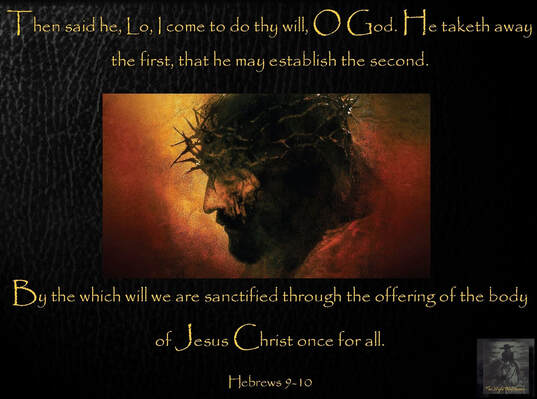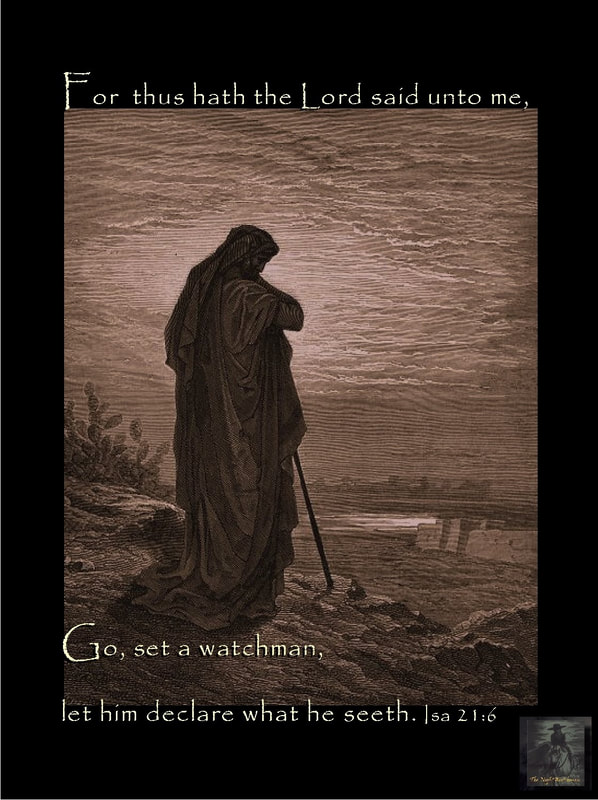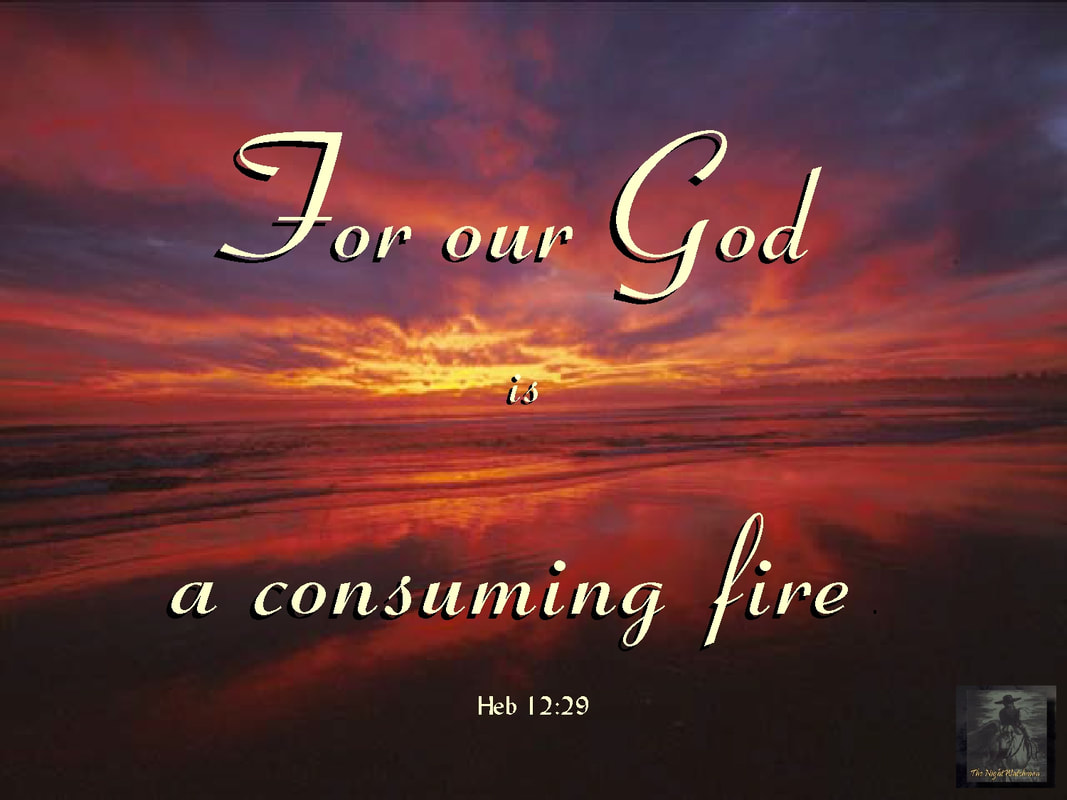|
Wherefore when he cometh into the world, he saith, Sacrifice and offering thou wouldest not, but a body hast thou prepared me: In burnt offerings and sacrifices for sin thou hast had no pleasure. Then said I, Lo, I come (in the volume of the book it is written of me,) to do thy will, O God. Above when he said, Sacrifice and offering and burnt offerings and offering for sin thou wouldest not, neither hadst pleasure therein; which are offered by the law; Then said he, Lo, I come to do thy will, O God. He taketh away the first, that he may establish the second. By the which will we are sanctified through the offering of the body of Jesus Christ once for all. Heb 10: 5-10 Lo, I Come None but the Son of God could offer unto the Father a sacrifice to please Him, and to reconcile us unto Him in a perfect manner. The burnt-offerings and sin-offerings were ordained merely as shadows and temporary types of that one offering, the self-devotedness of the Son of God to accomplish all the will of God, the counsel of salvation. It is the Divine and eternal offering of Himself unto the Father in which the incarnation and death of the Lord Jesus are rooted; it is the voluntary character of His advent and passion, and it is the Divine dignity of the Mediator, which render His work unique, to which nothing can be compared, and a repetition of which is impossible. Rise from the river to its source, from the rays of light and love to the eternal origin and fount. See in the life, the obedience, the agony of Jesus, the expression of that free surrender of Himself, and espousal of our cause, which was accomplished in eternity, in His own all-glorious and perfect divinity. Beware lest you see in Him only the faith and obedience, the sufferings and death of the Son of Man; see His eternal divinity shining through and sustaining all His humanity. This truth is revealed to us, not merely to establish our hearts in peace, and to fill us with adoring gratitude and joy, but here, marvelous to say, is held out to us a model which we are to imitate, a principle of life which we are to adopt. So wondrously are high mysteries and deep doctrines intertwined with daily duties, and the transformation of our character, that the Apostle Paul, when exhorting the Philippians to avoid strife and vain-glory, and have brotherly love and helpfulness, ascends from our lowly earthly path into this highest region of the eternal covenant. As we owe all to Him, let us be not merely debtors, but followers of Him who came, not to do His own will, and to be ministered unto, who came to love and to serve, to give and to bless, to suffer and to die. [A. Saphir, Lectures on Hebrews, vol. ii., p. 167] Perfect Sanctification THE ETERNAL WILL—“By the which wilt we are sanctified.” 1. This will must, first of all, be viewed as the will ordained of old by the Father—the eternal decree of the infinite Jehovah, that a people whom He chose should be sanctified and set apart unto Himself. 2. This wilt by which we are sanctified was performed of the ever blessed Son. 3. This work is applied to us by the Holy Spirit. THE EFFECTUAL SACRIFICE by which the will of God with regard to the sanctity of His people has been carried out. “By the which will we are sanctified through the offering of the body of Jesus Christ.” 1. This implies, first, His incarnation, which of course includes His eternal Deity. Jesus Christ, very God of very God, did certainly stoop to become such as we are, and was made in the likeness of sinful flesh. 2. All this is implied in the text, because it speaks of the offering of the body of Christ. But why does it specially speak of the body? I think to show us the reality of that offering; His soul suffered, but to make it palpable to you, to record it as a sure historical fact, He mentions that there was an offering of the body of Christ. 3. I take it, however, that the word means the whole of Christ—that there was an offering made of all Christ, the body of Him, or that of which He was constituted. THE EVERLASTING RESULT-THIS MAN IS NOW SAT DOWN AT THE RIGHT HAND OF GOD-No further sacrifices are to be made: Heb 10:12 But this man, after he had offered one sacrifice for sins for ever, sat down on the right hand of God; Heb 10:13 From henceforth expecting till his enemies be made his footstool. 1. The everlasting result of this effectual carrying out of the will of God is that now God regards His people’s sin as expiated, and their persons as sanctified. Offered, and its efficacy abides for ever. 2. They are reconciled. 3. They are purified. (C. H. Spurgeon.) When He Cometh Into the World Since the Levitical sacrifices could not cleanse from sin, Christ, the Redeemer from sin, said when he entered upon his mission, Sacrifice and offering thou wouldest not. Quoted from Psa_40:6-8. Psa 40:6 Sacrifice and offering thou didst not desire; mine ears hast thou opened: burnt offering and sin offering hast thou not required. Psa 40:7 Then said I, Lo, I come: in the volume of the book it is written of me, Psa 40:8 I delight to do thy will, O my God: yea, thy law is within my heart. Since the sacrifices and offerings of the Jewish altar did not meet God's will. A body hast thou prepared me for an offering. This is Christ's offering. In burnt offerings. Burnt offerings were wholly consumed. See Lev_1:17. Lev 1:17 And he shall cleave it with the wings thereof, but shall not divide it asunder: and the priest shall burn it upon the altar, upon the wood that is upon the fire: it is a burnt sacrifice, an offering made by fire, of a sweet savour unto the LORD. Sacrifices for sin. See Lev. 4:1 to 5:13. They were so called because of their special reference to sin. In neither had God pleasure; that is, they did not fully meet his will. Then said I, Lo, I come. The Psalmist represents Christ, who comes simply to do the will of God, completely surrendered to his will. In the volume of the book. In the roll of the law it is written of me; that is, there I am predicted. Then said he. He said, first, "The Levitical sacrifices do not please God;" then he said, second; Lo, I come to do thy will. This is pleasing to God. Hence he taketh away the first, the old covenant with its sacrifices, and establishes the second, the new covenant inaugurated by complete submission to the will of God. By which will we are sanctified. By this complete submission our sins are removed from us and we are made holy. The meaning of "sanctified" here is remission of sin. Through the offering of the body of Jesus Christ. In Christ's surrender his body was offered on the cross, once for all for sin, and by that offering our sins are remitted. [B.W. Johnson] Comments from Adam Clarke: "He taketh away the first - The offerings, sacrifices, burnt-offerings, and sacrifices for sin, which were prescribed by the law. That he may establish the second - The offering of the body of Jesus once for all. It will make little odds in the meaning if we say, he taketh away the first covenant, that he may establish the second covenant; he takes away the first dispensation, that he may establish the second; he takes away the law, that he may establish the Gospel. In all these cases the sense is nearly the same: I prefer the first." CHRIST’S ONE SACRIFICE IS ALTOGETHER SUFFICIENT That is, by the sacrifice of Christ, which was willingly offered up by himself, and was according to the will of God; it was his will of purpose that Christ should be crucified and slain; and it was his will of command, that he should lay down his life for his people; and it was grateful and well pleasing to him, that his soul should be made an offering for sin; and that for this reason, because hereby the people of God are sanctified, their sins are perfectly expiated, the full pardon of them is procured, their persons are completely justified from sin, and their consciences purged from it: even through the offering of the body of Jesus Christ once for all; this is said, not to the exclusion of his soul; it designs his whole human nature, and that as in union with his divine person; and is particularly mentioned, in allusion to the legal sacrifices, the bodies of slain beasts, which were types of him, and with a reference to his Father's preparation of a body for him, for this purpose, Heb_10:5. Moreover, his obedience to his Father's will was chiefly seen in his body; this was offered upon the cross; and his blood, which atones for sin, and cleanses from it, was shed out of it: and this oblation was "once for all"; which gives it the preference to Levitical sacrifices; destroys the Socinian notion of Christ's continual offering himself in heaven; and confutes the error of the Popish mass, or of the offering of Christ's body in it. [John Gill] A Living Sacrifice Trace the argument. Those old Jewish sacrifices had no value in themselves. The prophets—especially Isaiah and Hosea—made that quite plain. Their value lay solely in their being a means by which the will of a man was offered to God. When this is taught so as to be fully apprehended, formal sacrifice may cease. It has done its work. The final lesson is the Divine acceptance of the offering of Himself which came to Jesus. Christ’s whole life was His sacrifice. The sacrifice that God wants is the man, not something a man gives. The offering of a man himself is the offering of a life—that alone is the man. This makes Christ’s death the final act, the seal, the perfecting of His sacrifice; because that death completes, rounds off, the life. No life is complete until death seals it. Christ’s death is the great act of surrendered will under the most severe testing-conditions. Dead—human life ended—there is a whole man offered unto God.
That sacrifice—the spiritual sacrifice of the surrendered will—was offered through the body.—Things can have no influence on us that do not come within our range, do not lie in our plane. Moral forces are compelled to use material agencies because we are in material limitations. The surrender of the will of an angel is nothing to us. The surrender of the will of a human being like ourselves is everything to us. Christ became man that He might be able to offer a human sacrifice, because that is precisely what we ought to offer. An angel could not offer our sacrifice: the Son of God, as only Son of God, could not. Christ became representative man that He might offer His sacrifice of Himself in our name, as standing for and pledging us. That offering satisfies once for all.—Picture-teaching needs repetition, “line upon line, precept upon precept.” The teaching of principles is done once for all. Christ’s sacrifice need not be repeated, because it effected its end—1. With God. Did this representative offering of the surrendered will meet God’s requirement from us His creatures? The answer is the Resurrection. 2. With men. Was that devotion of Christ to our interests, which led Him to suffer so much in order to secure an acceptable sacrifice for us, such a devotion as could be really persuasive on us? The answer is our experience. The sacrifice of Christ must not be repeated, even in symbol. To repeat the sacrifice is to remove Christ from His present work of applying the gains of His sacrifice. What then have we to keep in mind? Is it only the medium, the bodily agency of the great sacrifice? Every incident of the Passion is intensely interesting to us. But there is a mystery within it. There is a real spiritual sacrifice. It is a man’s surrendered will. We cannot offer a material sacrifice with Christ. We can offer a spiritual sacrifice with Him. That we will offer it He pledges in our name. But our sacrifice, like His, must be made through our bodies. Our lives, lived unto God, are our sacrifice. [Preacher's Homiletical] So as Christ has purchased us by His own blood, now we look to Him as our pattern of service, and follow in His steps. Rom 12:1 I beseech you therefore, brethren, by the mercies of God, that ye present your bodies a living sacrifice, holy, acceptable unto God, which is your reasonable service. Rom 12:2 And be not conformed to this world: but be ye transformed by the renewing of your mind, that ye may prove what is that good, and acceptable, and perfect, will of God. Comments are closed.
|
Welcome
In this page there will be devotions/poems music and inspirational material 
The Lord Will Pour Out His Spirit
And it shall come to pass afterward, that I will pour out my spirit upon all flesh; and your sons and your daughters shall prophesy, your old men shall dream dreams, your young men shall see visions:
And also upon the servants and upon the handmaids in those days will I pour out my spirit. And I will shew wonders in the heavens and in the earth, blood, and fire, and pillars of smoke. The sun shall be turned into darkness, and the moon into blood, before the great and the terrible day of the LORD come. And it shall come to pass, that whosoever shall call on the name of the LORD shall be delivered: for in mount Zion and in Jerusalem shall be deliverance, as the LORD hath said, and in the remnant whom the LORD shall call. Joel 2:28-32 But this is that which was spoken by the
prophet Joel; And it shall come to pass in the last days, saith God, I will pour out of my Spirit upon all flesh: and your sons and your daughters shall prophesy, and your young men shall see visions, and your old men shall dream dreams: And on my servants and on my handmaidens I will pour out in those days of my Spirit; and they shall prophesy: Act 2:16-18 Resources
Madame Guyon - A Short and Easy Method of Prayer / Christian Audio Book (1 / 2) https://youtu.be/eihZWpAk7y4?si=PQ-_J3Y6i8u-N2Ac Union With God By Jeanne Guyon Chapter 1 Of 7 https://youtu.be/d5AfKS2dFLg?si=VtWAeEurkAddTDpL The Practice of the Presence of God - audiobook Brother LAWRENCE (1614 - 1691)- https://youtu.be/rRAs_BK1NR8?si=hGAL4C829aH7 DKMn Gander Story Poems
https://www.gander poems.org/ Archives
July 2024
|
Proudly powered by Weebly






